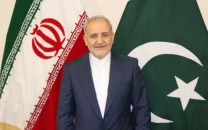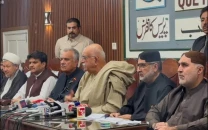Pakistan, India to set date for talks

Pakistan, India to set date for talks
“I intend to talk to my Indian counterpart S M Krishna at the end of their budget session on May 7 to find a mutually convenient date for a foreign ministerial level meeting,” he told a news conference in Islamabad. Pakistan’s High Commissioner to India Shahid Malik and Foreign Office spokesperson Abdul Basit were also present.
Qureshi said the ‘spirit’ behind future dialogue between India and Pakistan was right; therefore it did not matter whether the talks were labeled comprehensive talks, composite dialogue, or anything else. “We did not feel a need to create a new structure for talks,” he said, responding to a question about whether Pakistan had drifted from its insistence on resumption of the composite dialogue process. “The composite talks had various segments.
All the topics that made up those segments will be discussed [in future talks], so you can call it what you want.” with Pakistan, the prime ministers of both states had agreed that they could not restrict future dialogue because there were other problems to tackle. He said an understanding with India had been developed to discuss all issues, including Kashmir, Siachen and Sir Creek, instead of sticking to just terrorism. “The meeting was very fruitful, positive and cordial,” the foreign minister said.
“The peace process is back on track.” “I believe the Indian premier, who enjoys more mandate than before and has the backing of Congress, is very serious about the peace process,” Qureshi said. “I deliberately sought Indian premier’s opinion on a meeting between India and Pakistan in a third country,” Qureshi added. “If we have to meet, we will meet in our countries,” the foreign minister quoted the Indian premier saying.
To a question, he said the water issue was ‘a matter of life and death’ for Pakistan, which would allow options for its resolution. Qureshi said he felt “the water problem was being blown out of proportion” adding that there was no focus on conserving water and preventing its wastage at home. He rejected a suggestion that the Indus Water Treaty should be scrapped because it lacked an adequate mechanism to resolve water issues with India.
Qureshi also spoke about Pakistan’s other achievements at the Saarc summit, saying that member countries had agreed to adopt a comprehensive regional approach for resolving energy issues. However, he made no mention of Madhuri Gupta, a low-level Indian diplomat stationed in Pakistan who was arrested by Indian authorities in New Delhi days earlier, on charges of spying for Pakistan.
Prime Minister Yousaf Raza Gilani also issued a statement after his return from Bhutan, saying that his proposal that a regional study on climate change be commissioned by Saarc was adopted by the summit. Gilani said Saarc members had signed the Saarc convention on cooperation on environment, adding that ‘now we need to focus on sharing best practices and pooling our resources to adopt region-wide mitigation and adaptation measures.”
Gilani said Pakistan welcomed the inauguration of the Secretariat of the Saarc Development Fund in Thimphu, and noted that steady progress was being made towards starting operation at the Food Bank, the Saarc Arbitration Council and the Regional Standards Organisation. He also announced that Pakistan’s candidate had been elected Director-general of the arbitration council. Qureshi said that although India had previously only been interested in discussing terrorism



















COMMENTS
Comments are moderated and generally will be posted if they are on-topic and not abusive.
For more information, please see our Comments FAQ